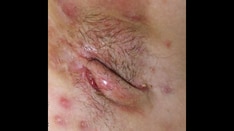| Author/year |
Study design |
Subjects |
Sample |
Limitations |
Intervention |
Findings |
Evidence level [31] |
| Weight loss interventions |
| Kjarsgaard Andersen et al./2021 [10] |
Prospective cohort |
Danish blood donors with self-reported HS |
430 |
Self-reported HS likely includes a higher rate of false positives than those diagnosed by a physician
Unknown and uncontrolled active treatment status |
Validated HS screening questionnaire administered at two time-points at least 6 months apart (no comparison)
HS assessed by: previously validated HS screening-questionnaire including all clinical obligatory diagnostic criteria |
Female weight loss: significantly associated with a higher likelihood of HS remission (HR = 1.07, 95% CI 1.05–1.11, p = 6.6 × 10−7)
Male weight loss: no association (HR = 1.00, 95% CI 0.97–1.04, p = 0.86) |
3 |
| Macklis et al./2021 [9] |
Cross-sectional survey |
Patients with self-reported HS on social media groups |
591 |
Recall bias
Selection bias
The statistical analysis demonstrates differences in symptom improvement across all attempted interventions but does not verify that improvements seen within any individual lifestyle intervention are statistically significant |
Single survey containing a combination of discrete and Likert scale questions on participant demographics, oral health, modifiable lifestyle factors, and HS symptom severity (no comparison)
HS assessed by: rating severity of HS before and after modifiable lifestyle changes using a combination of 5-point patient global assessment of disease (no disease, mild, moderate, severe, or very severe disease) and self-identification of Hurley stage using the previously validated HS Symptom Assessment tool |
Paleo, keto, gluten-free, anti-inflammatory, detox, Mediterranean, and "Other" diet categories: average improvement >0.6 subjective points
Paleo and anti-inflammatory diet categories: highest percentage of both 1 and 2+ point subjective improvements
Reduction in sugar: >0.7 subjective point, >0.3 levels Hurley improvement
Reduction in dairy: >0.5 subjective point, >0.2 levels Hurley improvement
Improvement for all weight loss categories: 0.6 subjective points, 0.3 levels Hurley improvement
Improvement for those who lost >50 lbs: >1 subjective point, 0.6 levels Hurley improvement |
3 |
| Garcovich et al./2018 [11] |
Retrospective descriptive study |
Hospital-based cohort of patients with validated HS and previous exposure to any type of BS intervention |
12 |
Selection bias
Recall bias
Confounding factors
Long latency period between the weight loss and the occurrence or change in HS activity |
Clinical characteristics and BS-related outcomes were retrospectively analyzed by chart review (no comparison)
HS assessed by: Hurley stage |
10/12 patients developed validated HS (primarily Hurley stage II/III) post-BS with >20% improvement in total weight loss
2/12 patients had HS prior to BS with neither seeing Hurley stage improvement post-BS |
3 |
| Kromann et al./2014 [7] |
Retrospective cohort |
Patients with HS with obesity (BMI >30) undergoing BS (gastric bypass or banding) |
35 |
Confounding variables
Response bias
Recall bias
Inclusion of only obese (BMI >30) individuals with substantial weight loss |
BS leading to weight loss of at least 15% (no comparison)
HS assessed by: previously validated HS questionnaire modified to include a description of the pre-surgical state, using the same questions
Graded the severity of their skin problems by use of an NRS |
17/35 (48.6%) experienced no HS symptoms after weight loss
7/35 (20%) experienced fewer active eruption sites
7/35 (20%) experienced no changes in disease activity
4/35 (11%) experienced more active eruption sites
The mean number of eruption sites was significantly reduced from 1.93 to 1.22 (p = 0.003, ES = 2.92)
Skin problems rated by NRS in those with HS symptoms and substantial weight loss showed a tendency to improve with a mean decrease of −0.2 (p = 0.74, ES = 0.48) [not significant] |
3 |
| Exacerbating and alleviating foods/diets |
| Fernandez/2020 [13] |
Cross-sectional questionnaire |
Patients with self-reported HS in Facebook HS support groups and North American HS specialty clinics |
770 |
Recall bias
Self-reported diagnosis of HS and Hurley stage |
Survey querying demographics, disease characteristics, and dietary patterns (no comparison)
HS assessed by: non-validated subjective improvement reported by respondents |
Exacerbating foods reported: sweets (67.9%); bread/pasta (51.1%); dairy (50.6%); high-fat foods (42.2%)
Alleviating foods reported: vegetables (78.7%); fruit (56.2%); chicken (51.7%); fish (42.7%) |
3 |
| Dempsey/2019 [12] |
Cross-sectional survey |
Self-reported HS from multiple sources |
242 |
Recall bias
Under-representation of male individuals
Confounding variables
Under-representation of the non-White population |
Survey querying food alterations in the prior 6 months
HS assessed by: self-reported HS activity |
65.2% of patients who made dietary changes perceived positive changes in their HS symptoms they attributed to diet
Tomato intake alteration (elimination) was negatively associated with improvement (OR = 0.236; p = 0.01)
Dairy alteration (elimination) was significantly associated with reported improvement (OR 2.18 [95% CI 1.01–4.68], p = 0.05)
Legume alteration (elimination) was significantly associated with reported improvement (OR 3.79 [95% CI 1.30–11.06], p = 0.01) |
3 |
| Kurzen et al./2019 [14] |
Retrospective cohort |
Patients with validated HS who had at least two clinic visits |
40 |
Confounding variables
Lack of data involving if weight changes were associated with these dietary interventions |
Dietary restrictions or influence of certain food compounds on HS severity were assessed in first clinic visit and on the second visit, proposed preventive strategies were inquired about and whether they had turned out to be helpful in the course of the disease (no comparison)
HS assessed by: non-validated subjective improvement reported by respondents |
9 respondents reported introduction of low-dairy/low-carbohydrate diet considerably improved HS subjective symptoms (2 were cases of gluten-sensitive enteropathy) |
3 |
| Damiani et al./2019 [19] |
Observational cross-over study |
Validated HS patients aged >18 years |
55 |
Small sample size
Lack of controls |
Ramadan fasting every day, from dawn to sunset, for one month (cross-over comparison)
HS assessed by: ADDI score, Hurley score, and IHS4 score |
Overall effect of fasting on the IHS4 score was statistically significant (F = 41.61, p < 0.0001)
35/51 (68.6%) patients experienced a decrease in the number of abscesses at the end of the Ramadan with 14/55 (25.5%) maintaining this improvement 1 month later
9/24 (37.5%) experienced a decrease in the number of draining fistulas with 15/24 (20.8%) maintaining this improvement 1 month later
The ectopic phenotype experienced the largest change in symptom severity before and after fasting (Delta IHS4 = −2.33 ± 0.58) |
3 |
| Lorite-Fuentes et al./2022 [15] |
Cross-sectional study |
Validated HS patients aged >18 years |
221 (from two separate populations) |
Differential selection bias due to inclusion of two different populations
Cross-sectional design impeding causal inference |
PREDIMED Questionnaire evaluating adherence to a Mediterranean diet and the International Physical Activity Questionnaire to determine activity level (no comparison)
HS assessed by: Hurley Stage, IHS4, self-reported disease activity by NRS |
Lower self-reported disease activity, lower self-reported Hurley score, and higher levels of physical activity were independently associated with higher adherence to the MD
Higher adherence to the MD was related to lower IHS4 (B = −0.10, p < 0.001)
Use of extra virgin olive oil as the main culinary liquid and poultry rather than red meat were dietary habits that implied a lower degree of disease severity (p < 0.05)
Self-reported disease severity (p = 0.14) and IHS4 (p = 0.27) showed an inverse trend in association with intensity of exercise regardless of adherence to MD |
3 |
| Cannistrà et al./2013 [20] |
Prospective single cohort |
All patients with HS followed at center
Patients had incision and debridement or surgical excision, followed by brewer's yeast-free diet |
12 |
Lack of control
All patients were found to have a specific immunology IgG reaction to ASCA (>10 U/mL) |
Brewer's yeast-free diet for 12 months (no comparison)
HS assessed by: clinical findings from follow-up appointments evaluating the number and severity of abscesses, fistulas, and lesions |
All patients demonstrated immediate stabilization of clinical symptoms with regression of skin lesions over the 12-month treatment period
All patients demonstrated an immediate recurrence of skin lesions following accidental or voluntary consumption of beer or other foods containing brewer's yeast or wheat |
3 |
| Aboud et al./2020 [22] |
Retrospective cohort questionnaire |
Thirty-seven patients were treated in a center for 6 years with a brewer's and baker's yeast definitive exclusion diet followed by operative intervention
The 148 other patients were members of a large, French, nonprofit public association of patients affected with HS |
185 |
Response bias
Recall bias |
Survey evaluating the long-term effectiveness of a yeast-exclusion diet protocol on the stabilization or regression of HS in comparison to other traditional treatments
HS assessed by: non-validated online questionnaire reporting subjective improvement in HS symptomology |
Of the 37 patients who had followed the yeast-exclusion diet:
26 patients (70%) reported an improvement of HS symptomatology without any other treatment, 21 of these 26 patients reported improvement occurred in less than 6 months
32 patients (87%) following the diet reported recurrence of HS symptoms after eating a restricted food |
3 |
| Barrea et al./2019 [16] |
Cross-sectional Study |
Forty-one treatment-naïve (no treatment for >3 months) patients with diagnosed HS for >6 months and 41 age-, sex-, and BMI-matched healthy Caucasian controls |
82 |
Cross-sectional design does not allow the determination of a causal association between MD and HS |
Adherence to the MD was assessed using a 14 question PREDIMED questionnaire that assigned a score 1 and 0 for each item
0–5: low adherence
6–9: average adherence
≥10: highest adherence (controlled)
HS assessed by: Sartorius HS score, Hurley Stages, and HS Physician's Global Assessment |
Higher values of HS Sartorius scores were evidenced in low adherers to MD, compared with average-higher MD adherers (p < 0.001)
Low adherence to MD: 59.38 ± 13.02 Sartorius score
Average adherence to MD: 51.37 ± 9.81 Sartorius score
High adherence to MD: 39.00 ± 8.76 Sartorius score |
3 |
| Micronutrient/supplement interventions |
| Molinelli et al./2020 [24] |
Cohort pilot study |
Hurley stage I and II HS previously treated with oral tetracycline (minocycline 100 mg daily) for 12 weeks with clinical and ultra-sonographic benefit |
92 |
Retrospective nature
Absence of a randomized blinded control group |
90 mg of zinc gluconate and 30 mg of nicotinamide once daily for 90 days (controlled) HS assessed by: mean Visual Analog Scale, Dermatology Life Quality, IHS4 evaluated at baseline, 90 days, and 180 days after treatment |
Treated group reported a significant marked reduction in mean Visual
Analog Scale, Dermatology Life Quality Index, and IHS4 scores compared with the control group both at 12 and 24 weeks (p < 0.005)
Disease-free survival was significantly longer and showed sustained improvement after discontinuation of oral supplementation in the treated group |
3 |
| Brocard et al./2007 [23] |
Cohort pilot study |
Mainly grade I or II Hurley classification HS that had previously been prescribed a treatment (antibiotic, isotretinoin, surgery, or anti-androgens), which was inefficient |
22 |
Inclusion of only low-stage HS and absence of a randomized blinded control group |
90 mg of zinc gluconate per day until complete or partial remission was obtained and then zinc gluconate was decreased by 15 mg every 2 months (not controlled)
HS assessed by: Hurley Staging |
8/22 (36%) experienced a complete remission (reduction in treatment to 30–60 mg of zinc gluconate caused relapses to occur, recurrences disappeared when the dose of zinc salts was increased back to 90 mg)
14/22 (63.6%) patients experienced partial remission
No patients experienced deterioration of their HS during the treatment
Dropout: 1 patient because of nausea and vomiting |
3 |
| Fabbrocini et al./2020 [25] |
Cohort pilot study |
Patients with HS treated for 6 months with topical or systemic therapies without significant clinical improvements |
40 |
Small size of the study
Lack of follow-up |
Oral supplementation with 25OHD for 6 months depending on status (sufficient = 0 IU of vitamin D/month; deficiency = 50.000 IU of vitamin D/month; insufficiency = 25.000 IU/month)
The supplementation was stopped when the level of 25-OHD was 30 ng/mL (controlled)
HS assessed by: Sartorius Score |
27 patients had a significant improvement of clinical responsivity to prescribed therapies (reduction of Sartorius Score of >20 points) equal to the increase of vitamin D levels |
3 |














